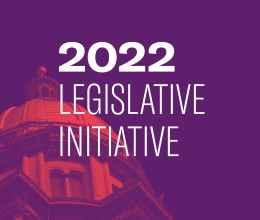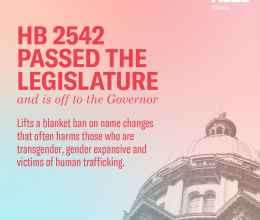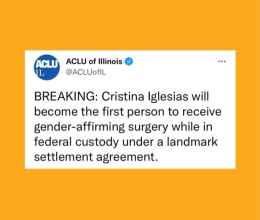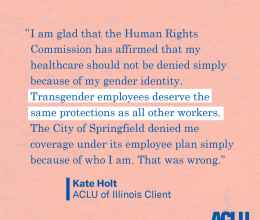Human Rights Commission says that Bed & Breakfast violated law when it denied downstate couple use of its facility for civil union ceremony
In a decision that has broad implications for how Illinois will protect LGBT persons seeking services from businesses offering their services to the public, the Illinois Human Rights Commission today ruled in favor of a downstate same-sex couple denied access to a bed & breakfast to hold their civil union ceremony after civil unions became available in 2011. The Commission found that the denial of use of the facilities was based on their sexual orientation in violation of Illinois law.
"We are thrilled by this decision," said Todd Wathen in response to the decision. "It was so hurtful to be turned away in this fashion when planning our civil union ceremony. Our hope is that as a result of this decision no other couple will be discriminated against by a facility, florist, baker or other business just because of who they are."
Shortly after Illinois approved civil unions early in 2011, Todd and Mark Wathen began planning their ceremony, searching for a location that would be convenient for their family in Kentucky and Missouri to be able to join them at a central location. After researching possible locations, they reached out via email to the Timber Creek Bed and Breakfast in Paxton -- a facility that advertised itself as available for civil weddings and other events -- the Wathens were rejected because their beliefs that “homosexuality is immoral and unnatural.” A few days later, the owner of Timber Creek sent another email to the Wathens lecturing them about his religious opinions regarding the “gay lifestyle” and his view that “[i]t’s not to[sic] late to change your behavior.”
Learn More |
|
|
|
|
Share this: |
When the Wathens filed the complaint with the Human Rights Commission, the Timber Creek owners defended the discrimination by claiming that their religious liberty would be offended if the facility -- open to other members of the public -- was used to celebrate a same-sex union.
"The ruling is critical. For the first time, the Human Rights Commission has made clear that owners of businesses serving the public in Illinois cannot pick and choose who to serve based on their personal religious views," said John Knight, director of the LGBT & HIV Project at the ACLU of Illinois. “This state recognizes just how harmful it is to deny couples services because of their sexual orientation and the importance of ensuring that all business comply with the Illinois Human Rights Act.”
During debate over the Illinois marriage law, opponents argued for a "carve out" that would permit business owners to deny basic services on the basis of a religious objection. Proponents of the law and, ultimately, a majority of the General Assembly, rejected this proposal, arguing that Illinois must protect its anti-discrimination laws that require business owners open to the public to serve everyone, regardless of gender, age, disability, race, ethnicity and sexual orientation. Today's decision was hailed by the Wathens' legal team as supporting that principle.
In the time since the Supreme Court of the United States found the freedom to marry for gay and lesbian couples to be constitutionally protected (extending marriage equality to all 50 states) some have attempted to argue that private companies and even public officials must be allowed to refuse service to gay and lesbian couples seeking to marry. Opponents of this argument have pointed out that allowing such a religious exemption is sanctioning discrimination.
Betty Tsamis, a lawyer in private practice in Chicago who also represents the Wathens noted that the ruling "builds on an important history of protecting against discrimination in public accommodations."
"It would have been shameful to reverse this history simply because some business owners object to the legal protections afforded same-sex relationships," added Ms. Tsamis.
In recent years, as the freedom to marry has expanded across the nation, courts have dealt with refusals by those who provide services to marriages. A Colorado court ruled two years ago that a baker there could not deny service to a gay couple for their wedding. In another case that gathered significant national attention, the New Mexico Supreme Court sided with a same-sex couple after a photographer refused to provide services for a commitment ceremony.
Clay A. Tillack and Tai C. Chaiken of the Chicago office of Schiff Hardin LLP also served as co-counsel in the case.
A copy of the decision can be found here.





